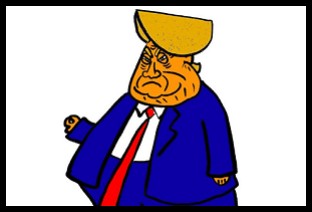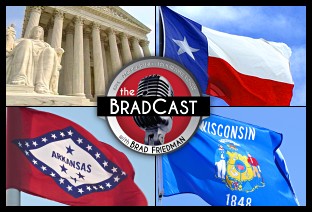- with Brad Friedman
[An earlier version of this article was originally published by Truthout...]
 Both election integrity advocates and dissembling GOP proponents of Photo ID voting restrictions were taken by surprise in late 2013 when 7th Circuit Court Judge Richard A. Posner said, during an interview with HuffPo Live, that the landmark 2008 Supreme Court decision on the matter "would have been decided differently" if the Court had known then "about the abuse of voter identification laws."
Both election integrity advocates and dissembling GOP proponents of Photo ID voting restrictions were taken by surprise in late 2013 when 7th Circuit Court Judge Richard A. Posner said, during an interview with HuffPo Live, that the landmark 2008 Supreme Court decision on the matter "would have been decided differently" if the Court had known then "about the abuse of voter identification laws."
That, in and of itself, was a remarkable turn of events. What was ultimately to come was even more so.
Crawford v. Marion County Election Board is the case which Republican proponents of strict Photo ID voting laws now (incorrectly and often disingenuously) cite as giving them carte blanche to enact similar laws in other states, irrespective of the extent to which photo ID laws serve to disenfranchise demographic groups --- minorities, students, the poor, women --- that all tend to vote for Democrats.
Posner is not just any judge. He is a renowned legal scholar and Reagan appointee to the federal bench, who has served on the U.S. 7th Circuit Court of Appeal since 1981. More importantly here, Posner was the author of the 7th Circuit's opinion in Crawford. In that case, Posner rejected an allegation that Indiana's polling place photo ID restriction was unconstitutional. That decision was affirmed at the time by the U.S. Supreme Court.
Posner, who is, as Yale Law Professor Fred Shapiro notes, the most cited jurist of the 20th Century, was not alone in his view in 2013 year that Crawford "would have been decided differently" if the Court knew then what it knows now.
Former Supreme Court Justice John Paul Stevens, the author of the plurality opinion in Crawford --- an opinion that was joined by Chief Justice Roberts and Justice Kennedy --- told the Wall Street Journal following Posner's remarks at the time, that he "always thought that [dissenting Justice] David Souter got the thing correct, but my own problem with the case was that I didn't think the record [before the Court in 2008] supported everything he said in his opinion." Souter would have struck down the Indiana law as unconstitutional because, as he argued at the time, it "threatens to impose nontrivial burdens" upon the right to vote.
Joined by four other 7th Circuit jurists last October, Posner penned an extraordinarily powerful and compelling dissent [PDF] in Wisconsin's photo ID voting case. The previously missing evidence is now in, as the judge meticulously detailed in the opinion. GOP claims that photo ID restrictions are needed to combat "voter fraud", he wrote, are "a mere fig leaf for efforts to disenfranchise voters likely to vote for the political party that does not control the state government"...
Posner's carefully crafted dissent does more than establish why the U.S. Supreme Court should ultimately sustain the District Court's finding that Wisconsin's photo ID law is both unconstitutional and a violation of the Voting Rights Act --- a finding later echoed by a federal District Court in Texas as well. Posner's dissent obliterates the factual premise that had served as a pillar upon which his, and subsequently the Supreme Court's, decisions in Crawford were based.
Polling place photo ID laws do not promote voter confidence in the integrity of elections, as Posner and the Crawford Supreme Court plurality had erroneously assumed. The assertion that they do was a "mistake" --- Posner's mistake! --- and he now admits as much, with the support of devastating new data from recent studies to back him up.
His powerful dissent amounts to more than just a response to the Wisconsin GOP's new Photo ID voting law. It is an elegant plea that the U.S. Supreme Court finally right a grievous wrong that he was personally responsible for. Posner presents an astonishing, air-tight case for ruling that all "strict Photo ID laws," which, as he demonstrates, have only been enacted in states sporting GOP-controlled legislatures, must now be struck-down as unconstitutional...


 Sunday 'TACO Trump on Every Corner' Toons
Sunday 'TACO Trump on Every Corner' Toons Sunday 'Cutting Corners' Toons
Sunday 'Cutting Corners' Toons 'A World of Tyrants,
'A World of Tyrants, 'Green News Report' 5/22/25
'Green News Report' 5/22/25
 Climate Scientist Warns Trump 'Censorship' Endangering NatSec: 'BradCast' 5/21/25
Climate Scientist Warns Trump 'Censorship' Endangering NatSec: 'BradCast' 5/21/25 And Then They Came for Members of Congress...: 'BradCast' 5/20/25
And Then They Came for Members of Congress...: 'BradCast' 5/20/25 'Green News Report' 5/20/25
'Green News Report' 5/20/25 Court Blocks Last Route for Voter Challenges Under VRA: 'BradCast' 5/19/25
Court Blocks Last Route for Voter Challenges Under VRA: 'BradCast' 5/19/25 Sunday 'Now Hoarding' Toons
Sunday 'Now Hoarding' Toons Mad World: 'BradCast' 5/15/2025
Mad World: 'BradCast' 5/15/2025 'Green News Report' 5/15/25
'Green News Report' 5/15/25 Plane Corruption and the Future of the DOJ: 'BradCast' 5/14/25
Plane Corruption and the Future of the DOJ: 'BradCast' 5/14/25 GOP Proposes 'Deeply Evil' Cuts to Medicaid: 'BradCast' 5/13/25
GOP Proposes 'Deeply Evil' Cuts to Medicaid: 'BradCast' 5/13/25 And Then They Came for the Mayors...: 'BradCast' 5/12/25
And Then They Came for the Mayors...: 'BradCast' 5/12/25 Blowing Smoke. At the Vatican and White House: 'BradCast' 5/8/25
Blowing Smoke. At the Vatican and White House: 'BradCast' 5/8/25 SCOTUS Weighs Public Funding of Religious Schools: 'BradCast' 5/7/25
SCOTUS Weighs Public Funding of Religious Schools: 'BradCast' 5/7/25 Trump Judge Blocks NC GOP Theft of 2024 Supreme Court Seat: 'BradCast' 5/6/25
Trump Judge Blocks NC GOP Theft of 2024 Supreme Court Seat: 'BradCast' 5/6/25 Prosecutors Quit After U.S Attny Strikes Deal With Felon Cop: 'BradCast' 5/5/25
Prosecutors Quit After U.S Attny Strikes Deal With Felon Cop: 'BradCast' 5/5/25 Trump Losing Streak Continues into SECOND Hundred Days: 'BradCast' 5/1/25
Trump Losing Streak Continues into SECOND Hundred Days: 'BradCast' 5/1/25
 VA GOP VOTER REG FRAUDSTER OFF HOOK
VA GOP VOTER REG FRAUDSTER OFF HOOK Criminal GOP Voter Registration Fraud Probe Expanding in VA
Criminal GOP Voter Registration Fraud Probe Expanding in VA DOJ PROBE SOUGHT AFTER VA ARREST
DOJ PROBE SOUGHT AFTER VA ARREST Arrest in VA: GOP Voter Reg Scandal Widens
Arrest in VA: GOP Voter Reg Scandal Widens ALL TOGETHER: ROVE, SPROUL, KOCHS, RNC
ALL TOGETHER: ROVE, SPROUL, KOCHS, RNC LATimes: RNC's 'Fired' Sproul Working for Repubs in 'as Many as 30 States'
LATimes: RNC's 'Fired' Sproul Working for Repubs in 'as Many as 30 States' 'Fired' Sproul Group 'Cloned', Still Working for Republicans in At Least 10 States
'Fired' Sproul Group 'Cloned', Still Working for Republicans in At Least 10 States FINALLY: FOX ON GOP REG FRAUD SCANDAL
FINALLY: FOX ON GOP REG FRAUD SCANDAL COLORADO FOLLOWS FLORIDA WITH GOP CRIMINAL INVESTIGATION
COLORADO FOLLOWS FLORIDA WITH GOP CRIMINAL INVESTIGATION CRIMINAL PROBE LAUNCHED INTO GOP VOTER REGISTRATION FRAUD SCANDAL IN FL
CRIMINAL PROBE LAUNCHED INTO GOP VOTER REGISTRATION FRAUD SCANDAL IN FL Brad Breaks PA Photo ID & GOP Registration Fraud Scandal News on Hartmann TV
Brad Breaks PA Photo ID & GOP Registration Fraud Scandal News on Hartmann TV  CAUGHT ON TAPE: COORDINATED NATIONWIDE GOP VOTER REG SCAM
CAUGHT ON TAPE: COORDINATED NATIONWIDE GOP VOTER REG SCAM CRIMINAL ELECTION FRAUD COMPLAINT FILED AGAINST GOP 'FRAUD' FIRM
CRIMINAL ELECTION FRAUD COMPLAINT FILED AGAINST GOP 'FRAUD' FIRM RICK SCOTT GETS ROLLED IN GOP REGISTRATION FRAUD SCANDAL
RICK SCOTT GETS ROLLED IN GOP REGISTRATION FRAUD SCANDAL VIDEO: Brad Breaks GOP Reg Fraud Scandal on Hartmann TV
VIDEO: Brad Breaks GOP Reg Fraud Scandal on Hartmann TV RNC FIRES NATIONAL VOTER REGISTRATION FIRM FOR FRAUD
RNC FIRES NATIONAL VOTER REGISTRATION FIRM FOR FRAUD EXCLUSIVE: Intvw w/ FL Official Who First Discovered GOP Reg Fraud
EXCLUSIVE: Intvw w/ FL Official Who First Discovered GOP Reg Fraud GOP REGISTRATION FRAUD FOUND IN FL
GOP REGISTRATION FRAUD FOUND IN FL



















 On this week's
On this week's 
 Though some 5,350 voters are known to have voted in the city of Stoughton in Dane County, Wisconsin on Tuesday, just 16 of those voters were interested in voting in a local ballot referendum calling for an amendment to the U.S. Constitution to help overturn the
Though some 5,350 voters are known to have voted in the city of Stoughton in Dane County, Wisconsin on Tuesday, just 16 of those voters were interested in voting in a local ballot referendum calling for an amendment to the U.S. Constitution to help overturn the  Perhaps we can chalk up its popularity to the joke it makes of right wing groups like "True the Vote" which has, since
Perhaps we can chalk up its popularity to the joke it makes of right wing groups like "True the Vote" which has, since  With the latest
With the latest  On the stump this week for Republican candidates, NJ's Gov. Chris Christie said GOP governors need to win this year, so they can be in control of the "voting mechanisms" during what he believes might be his own run for President in 2016. He cited three races in particular, in three states that would be crucial to him as the GOP nominee, as
On the stump this week for Republican candidates, NJ's Gov. Chris Christie said GOP governors need to win this year, so they can be in control of the "voting mechanisms" during what he believes might be his own run for President in 2016. He cited three races in particular, in three states that would be crucial to him as the GOP nominee, as  Well, it is still very likely that some 600,000 legally registered voters in Texas will find themselves unable to vote at the polls this year in the Lone Star State, thanks to the
Well, it is still very likely that some 600,000 legally registered voters in Texas will find themselves unable to vote at the polls this year in the Lone Star State, thanks to the  As the plaintiffs in the otherwise successful challenge to Texas Republicans' polling place Photo ID restriction law pointed out during their
As the plaintiffs in the otherwise successful challenge to Texas Republicans' polling place Photo ID restriction law pointed out during their 







 You'll have to scroll down past the initial Ebola stuff, but thereafter,
You'll have to scroll down past the initial Ebola stuff, but thereafter,  Well,
Well,  This is not unexpected, though its still disturbing to those concerned about voting rights and the possibility that more than half a million legally registered voters in Texas may not be allowed to vote in this November's election.
This is not unexpected, though its still disturbing to those concerned about voting rights and the possibility that more than half a million legally registered voters in Texas may not be allowed to vote in this November's election.  Hopefully you've read the
Hopefully you've read the  If you read just one top-to-bottom dismantling of every supposed premise in support of disenfranchising Photo ID voting restrictions laws in your lifetime, let it be
If you read just one top-to-bottom dismantling of every supposed premise in support of disenfranchising Photo ID voting restrictions laws in your lifetime, let it be 












